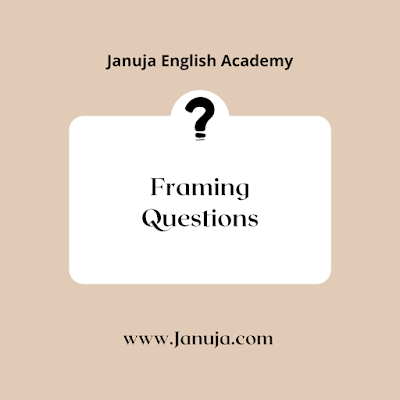We are now going to learn how to frame questions from statements.
There are two types of questions in the English Language.
1. ‘Yes/No’ Questions
2. ‘Wh’ Questions
Let’s see how we frame these questions using the highlighted words.
# Haritha made some noodles.
Who made noodles?
# Neetu wished her teacher.
Who did Neetu wish? / Whom did Neetu wish?
# The fan has fallen on the floor.
What has fallen on the floor?
# She goes walking every morning.
What does she usually do every morning?
# Anjali went to Mumbai last month.
Where did Anjali go last month?
# Yes, he likes cats.
Does he like cats?
# Her uncle will come tomorrow.
When will her uncle come?
# This is Gita’s pen.
Whose pen is this?
# Sam stayed at school to complete the project work.
Why did Sam stay at school?
# They stayed in Chennai for a week.
How long did they stay in Chennai?
# Keerthi gets Rs 50,000 salary from her job.
How much salary does Keerthi get from her job?
# Dravid plays tennis once a week.
How often does Dravid play tennis?
# No, I have not brought those grapes.
Have you brought these grapes?
# I am 35 years old.
How old are you?
# There are 6 members in our family.
How many members are there in your family?
# No, I won’t buy a house here.
Will you buy a house here?
# Yes, you can take my car.
Can I take your car?
# No, he hasn’t read the newspaper yet.
Has he read the newspaper yet?
# I am going to Vijayawada next week.
When are you going to Vijayawada?
# They were sleeping when you called them yesterday.
What were they doing when I called them yesterday?
# Yes, I am hungry.
Are you hungry?
# Kishore has spent Rs 2000 on that shirt.
How much money has Kishore spent on this shirt?
Practice Bits
Frame questions from the following statements assuming the highlighted words as answers to your questions.
1. Manasa is coming here tomorrow.
2. He is 25.
3. Mayuri will go to Guntur next week.
4. They went to the market to buy some vegetables.
5. Sreya met her grandfather yesterday.
6. Bujji prepares noodles every Sunday.
7. Kiran paid Rs 60,000 for that smartphone.
8. Poorvansh was driving when Nitya called him yesterday.
9. TATAs have been preparing to enter mobile manufacturing for the last 6 months.
10. Yes, he is going to Mumbai next month.
Best Grammar Book for Competitive Exams


